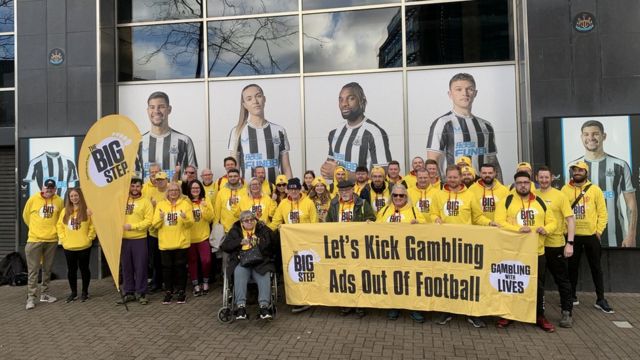
Image source, The Big Step
Former gambling addicts and their families are marching across the North East as part of a campaign to persuade the government to ban gambling adverts in football.
Campaigners are walking 40 miles (65km) from Tyneside to Teesside via the area’s three biggest clubs – Newcastle, Sunderland and Middlesbrough.
All three have gambling firms as front-of-shirt sponsors.
Bodies overseeing the betting industry said firms abide by strict guidelines.
Organised by campaign group The Big Step, the march began on Friday outside Newcastle’s St James’ Park and then visited Sunderland’s Stadium of Light.
It is expected to finish at Middlesbrough’s Riverside Stadium at about 17:30 GMT.
Among the marchers was Joe Clarkson who spent two-and-a-half years in jail after stealing about £750,000 to fund his gambling addiction.
‘Pinching from my family’
“I was spending four, five, six times my salary every year, feeding that habit any way I could – through stolen funds, pay-day loans, overdrafts,” he said.
“It was my life from being 14 or 15. I believed I could make money through my knowledge of football. That was the stupidity of it.
“I very quickly realised I couldn’t, but by then I was in debt – skint – pinching from my family until the lies became incredible.
“I don’t recognise the person I used to be.”

The Big Step’s founder, recovering addict James Grimes, said: “All of us [on the march] have experience of gambling-related harm. We’re doing it to try to convince the government to put an end to these harmful deals.
“The reality is football isn’t listening. We’ve tried to engage with clubs time and time again, but we just get a closed door.”
The event comes ahead of the publication of the government’s Gambling Act review, which campaigners hope will include measures such as advertising restrictions, affordability checks and stake limits on online slot and casino games.
The act was introduced in 2005 allowing gambling firms to advertise sports betting, poker and online casinos on TV and radio, and predated the arrival of smartphones.
Public Health England estimates there are about 400 gambling-related suicides in the country each year.
The Betting and Gaming Council, which represents the industry, said betting advertisements and sponsorship must comply with already-strict guidelines.
Industry regulators the Gambling Commission said its rules ensure marketing was done in a socially-responsible manner.
